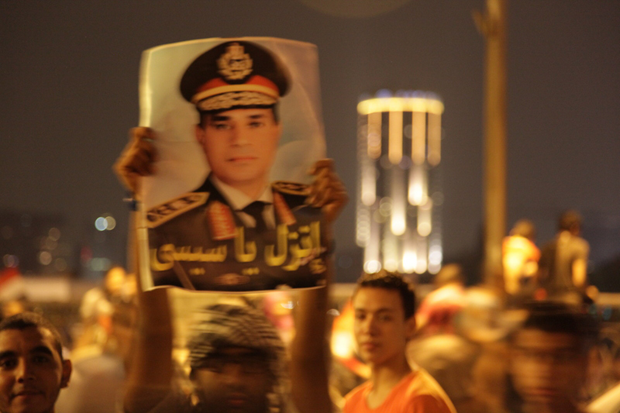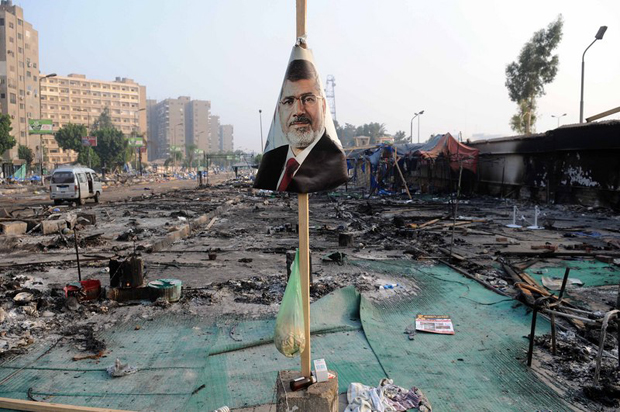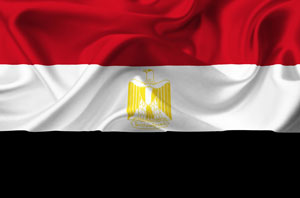Index relies entirely on the support of donors and readers to do its work.
Help us keep amplifying censored voices today.

Egyptians gathered on the in Corniche near Qasr Nil Bridge in July 2013 to celebrate news of the announcement by the Egyptian Army Chief General el Sisi, that President Morsi had been removed from power in “response to the will of the people.” (Photo: Sharron Ward / Demotix)
Last week, when Egyptian security forces violently dispersed activists rallying against a controversial new anti-protest law, Egyptian media was full of praise for them the following day. Instead of condemning the excessive use force by riot police who beat, sexually assaulted and detained scores of opposition protesters, newspaper editors portrayed the Interior Ministry as “the victor” in the confrontation over the new gag law.
“The Interior Ministry has passed the test on the anti-protest law,” read Wednesday’s bold red headline in the semi-official Al Ahram daily. The independent Al Watan, meanwhile, declared on its front page that the Ministry of Interior had “decidedly resolved the battle over the anti-protest law.”
Headlines, editorials and articles labelling democracy activists “anarchists and “thugs” signal that most Egyptian media has reverted to its old pre-revolution ways, siding with the military-backed government against the opposition. During the January 2011 mass uprising that toppled former President Hosni Mubarak, Egyptian media had vilified the opposition activists, describing them as “foreign agents” and “hired thugs.”
Media discourse in Egypt today is reminiscent of the Mubarak era. Then, almost all media outlets had adopted the state line and carefully avoided crossing the so-called ‘red lines’. The only difference is that today, the media has voluntarily and ungrudgingly aligned itself with the military-backed government. During Mubarak’s tenure journalists were motivated by fear of falling out of favour with the authoritarian regime. Ironically, since Muslim Brotherhood President Mohamed Morsi was toppled by military-backed protests last July, the Egyptian media’s support for the country’s powerful military has come with little coercion from the generals who are riding a wave of popularity and ultra-nationalist sentiment.
Since Morsi’s ouster, the Egyptian media has glorified the military while persistently demonising both the Muslim Brotherhood and the deposed Islamist President, continuing the vilification trend it had started when the former president was still in power. Morsi’s supporters have consistently been branded “terrorists” and “liars” by Egypt’s state-owned and private media alike. As Morsi’s supporters staged a sit in last July demanding “the reinstatement of the legitimate president”, Youssef El Husayni, a presenter on the privately-owned channel ON TV accused the protesters of murder, saying that they “deserved to be hanged.” Other TV talk show hosts also accused the anti-coup protesters of “getting paid to stay on the streets”. On November 4, the day Morsi’s trial began, the former president was labelled “hysterical” by several Egyptian newspapers including the independent El Youm el Sabe’e and El Masry El Youm for insisting he was still the country’s legitimate president and could not be tried by the court. He was also criticized by journalists for refusing to wear his prison uniform to court–a decision that drew unfavourable comparisons with his predecessor Hosni Mubarak who had previously appeared in court in the white garment.
Earlier this month, the privately-owned network CBC suspended satirist Bassem Youssef’s wildly popular show Al Bernameg (The Programme) after an episode that poked fun at the public fervour for the military and in particular, at the ‘Sissi-mania’ gripping the country. Egypt’s De facto ruler El Sissi earned the adoration of millions of Egyptians when he ousted Morsi, positioning himself as the “guardian of the people’s will” and claiming he had “saved the country from a looming civil war.” He has since been compared by some Egyptian media to Egypt’s former ultra-nationalist leader Gamal Abdel Nasser. In recent months, there have increasingly, been calls for El Sissi to run in the next presidential election.
Surprisingly, the decision to take Youssef’s show off the air came from CBC’s senior management not–as many had initially believed–from strongman El Sissi. Youssef’s last episode met with a public outcry and almost immediately after the broadcast, CBC issued a statement distancing itself from the comedian’s views. The station blamed the suspension of the show on “technical” and “business” issues rather than on the show’s editorial content. CBC’s decision has led to fierce public criticism of the network which had previously given Youssef a free hand to mock former President Mohamed Morsi and his Islamist group. Throughout Morsi’s one year term in office, Youssef had relentlessly kept up his attacks on the former President despite repeated threats of legal action against him. Many of Youssef’s fans have threatened to boycott CBC after the TV satirist quit the channel over the suspension of the show.
Meanwhile, the “red lines” are back at Egyptian State TV where show presenters and anchors have kept up the pro-military rhetoric in recent months for fear of being stigmatized as “pro-Muslim Brotherhood ” and “fifth columnists.” The latter is a term that is being widely used to describe sympathizers or supporters of the Muslim Brotherhood whose activities were banned by a court ruling in November. Presenters who are suspected of being sympathetic to the outlawed Islamist group are being deprived of air time. Several presenters have faced investigations in recent weeks over “their shameful links to the enemy Islamist group”. Journalists have been repeatedly accused of “destroying the country and wreaking havoc to abort the goals of the revolution.” A list of names of so-called “fifth column TV presenters and activists” has gone viral on social media networks Facebook and Twitter after being posted on several local websites with the declared aim of “exposing and sidelining the traitors.” Those on the list–which includes reform leader El Baradei, revolutionary activists and prominent TV journalists known for their objectivity–have also being accused of receiving foreign funding.
Many journalists have again resorted to practising self-censorship for fear of being labelled “enemies of the state.” Ironically, the pressure on them has come from fellow-journalists rather than from the generals themselves. Those piling the pressure are journalists who were either appointed by the ousted Mubarak regime or others with strong links with the country’s notorious security services. In September, controversial talk show host Tewfik Okasha, who is also the owner of the private El Fara’een Satellite Channel, gave Defence Minister El Sissi “an ultimatum to purge the media of fifth columnists”. Abdel Rahim Ali, the chief editor of El Bawaba news site, meanwhile told Al Midan TV in September that “those who oppose the reinstatement of state security are from the fifth column.” He did not hesitate in naming the activists and political figures he suspected had links with the “Islamist terror organization.” Responding to a list of suspect-fifth columnists published in the state-owned Al Ahram El Arabi in September, veteran columnist Fahmi Howeidi warned that “such accusations only serve to further empower the country’s notorious state security service, the SSS.” The SSS, known in Egypt as “Amn El Dawla” was a symbol of police oppression under ousted President Hosni Mubarak. It was disbanded in March 2011 only to return a month later, albeit under a different name–the National Security Service.
The “Fifth Column Campaign” targeting government critics with the aim of silencing voices of dissent, has succeeded in fulfilling its objective, lament rights campaigners.
“In this atmosphere of deep political divisions and at a time when anyone can be accused of espionage for merely mentioning such ‘taboo’ words as ‘coup’ and ‘reconciliation’, many in our profession have opted to play it safe by siding with the stronger power–the military. This is an indirect way of muzzling the press and unfortunately, it is working,” Sameh Kassem, Cultural Editor who works for the independent Al Dostour said.
In the ‘new Egypt’ –now once again under the tight grip of military rule — where scores of journalists have been assaulted and detained for covering the anti-coup protests, the critics are falling silent.
This article was published on 3 Dec 2013 at indexoncensorship.org

Egypt faced a new phase of uncertainty after the bloodiest day since its Arab Spring began, with nearly 300 people reported killed and thousands injured as police smashed two protest camps of supporters of the deposed Islamist president. (Photo: Nameer Galal / Demotix)
As the numbers steadily mount of those killed by the Egyptian military and police in yesterday’s attacks on Muslim Brotherhood camps, the prospects for Egypt’s ‘Arab spring’ are looking bleak.
The violent destruction of the two camps, and the indiscriminate shootings, beatings and arrests of supporters of ousted President Mohamed Morsi, and of journalists, was clearly planned. The country’s military rulers have taken little time to demonstrate their contempt for the many Egyptians who wrongly thought the army could usher in a more pluralist rights-respecting democracy. The hopes of those who saw July’s coup as somehow too positive to warrant such a label now lie in tatters, with Mohamed ElBaradei’s inevitable resignation just one small illustration of that.
Is this simply a return to square one – back to a Mubarak-style, military-run Egypt? At one level surely it is, with army head General al-Sisi showing neither shame nor compunction in such a murderous installation of the new state of emergency.
But while the similarities to the Mubarak era are clear, this is a new and different Egypt. The millions who demonstrated in Tahrir Square in 2011, and again this June in protest at President Morsi’s authoritarian approach to government, are not simply going to accede to corrupt and vicious military rule once more. And the brutal violence against the Muslim Brotherhood protesters is most likely to beget more violence rather than the destruction of the Brotherhood that the army appears intent on.
With the violent face of the new Egyptian regime now clearly on display to the whole world, with no respect for rights of protesters, or media, or ordinary citizens, the international response has been shamefully muted. The EU’s foreign policy supremo, Cathy Ashton, called for the military to exercise the “utmost restraint” and for an end to the state of emergency “as soon as possible, to allow the resumption of normal life”. Meanwhile Samantha Power, Obama’s UN ambassador, tweeted weakly that the “forcible removal” of protesters was “a major step backward”.
Earlier in the week, the US and EU failed in their mediation attempts to stop the attacks on the camps, that all could see were coming. The key question now should be whether they are prepared to go for tougher diplomacy in an attempt to exert some leverage on the disastrous social and political dynamics that have now been unleashed so far. This would have to revolve around suspension of the $1.3 billion of military aid the US gives Egypt each year.
Obama’s first statement of condemnation finally came today but with no hint of the sort of leadership or signal that suspension of aid would send. Obama’s cancellation of military exercises next month will not worry Egypt’s generals much. And his uplifting speech on a new beginning at Cairo University in 2009 – and his Nobel Prize that year – are surely now lost in the dust and ashes of the aftermath of Wednesday’s violence and the US’s refusal to use the tools of influence it has. For now, more urgent and serious statements are coming rather from the UN.
Whether Egypt’s citizens who demonstrated for an end to military rule, and for a genuine pluralist democracy can regroup enough to have the influence to stop the downward spiral looks doubtful. But the spirit of Tahrir Square did not die yesterday. And if Egypt is now in winter, then spring at some point must come again. But for now the winter looks to be just beginning.
When Defense Minister and Deputy Prime Minister Abdel Fattah El Sissi last week called on ‘loyal’ Egyptians to take to the streets to give him a mandate to confront what he called “terrorism,” tens of thousands of Egyptians rallied in major squares across the country, expressing their solidarity with the army chief they believed was acting to save Egypt from the scourge of civil war.
In Cairo’s eastern suburb of Nasr City meanwhile, thousands of Islamist supporters of deposed President Mohamed Morsi continued their sit-in outside a mosque, demanding Morsi’s re-instatement and denouncing what they describe as a “military coup against legitimacy.”
In the deeply polarized country, a seemingly unbridgeable gap between the two opposing rival camps and the intolerant attitude of you-are-either-with-us-or-against-us adopted by both Morsi’s opponents and his supporters, have left little room for neutrality. Yet, amidst the conflict and division, a third group has emerged — one whose members hope to re-unite Egyptians behind the common cause of “a free, democratic and civil Egypt.”
Made up of around 400 liberals, leftists and moderate Islamists, the so-called “Third Square” movement opposes both the military and the Muslim Brotherhood and is trying to promote a middle way amid the political turmoil, reminding Egyptians that they need to continue to work to achieve the goals of the January 2011 Revolution.
The opposition movement has adpoted the motto of “Down with all those who betrayed us: the Muslim Brotherhood, the army and Mubarak regime loyalists.” Since Islamists made sweeping gains in the 2012 parliamentary elections, the Muslim Brotherhood has often been accused by the liberal opposition of “stealing the revolution.” Meanwhile, during the transitional period when the SCAF was in power, revolutionary activists blamed the ruling military regime for the widespread human rights abuses — including the disappearance, detention and torture of hundreds of revolutionary activists — saying “the masks of the army generals running the country have dropped” and “the army and the people were never one hand.”
“The Muslim Brotherhood and the army are two faces of the same coin,” said activist/blogger Tarek Shalaby who joined the movement’s protest rally held at Sphinx Square in Cairo’s upscale neighborhood of Mohandessin last Sunday. “We neither want to be ruled by intolerant islamists whose aim is to establish a theocracy nor do we want a return to military dictatorship. ”
“No to the military junta; No to an Islamic state” and “Yes to a civil state,” read the banners raised by the activists at Sunday’s rally. The protesters also carried pictures of El Sissi and Morsi crossed out in red.
Shalaby and the other Third Square activists have used Facebook and Twitter to organize a series of protest rallies and mobilize support for their nascent movement. Posting humorous anecdotes that poke fun at the former rulers (SCAF and the Muslim Brotherhood), they also use the social media network to engage in lively discussions on the way forward for Egypt.
“We are trying to create a space where the January 2011 Revolution can stay alive and flourish. Our movement takes a firm stance against all counter-revolutionary forces . We hope to recruit more and more revolutionaries to the cause, paving the way for a political infrastructure that can lead to the democratic, civil society we aspire for,” said Shalaby.
Launched no more than a fortnight ago, the movement’s Facebook page has already attracted more than 8,300 fans and the number of followers is increasing. Yet, on the streets of Cairo, the voices of the Third Square activists are being drowned out by the cries of protesters in the two main opposing camps. Tamarod, the movement that organized the June 30 mass protests demanding Morsi’s ouster (and which now backs the interim government that replaced him) has accused the Third Square of being “counter-productive and divisive.”
“The movement is dividing the people. They are living in the past. Now is the time for consensus, we need to move forward,” Tamarod spokesman Mohamed Abdul Aziz told Voice of America. He also alleged the movement was “being led by Islamists” referring to former presidential candidate and Muslim Brotherhood member Abdel Moneim Abul Fottouh, whose Strong Egypt Party is heading the initiative.” It is a new face of the Muslim Brotherhood”, he told Daily News Egypt.
Pro-Morsi protesters camped out in Cairo’s northeastern suburb of Nasr City welcome the initiative, describing it as a “new front in the battle against military rule”.
“We welcome any movement that supports the goals of the January 2011 Revolution. It doesn’t bother us that the Third Square is against Morsi and the Muslim Brotherhood. At least they oppose the military coup”, said Amany Kamal, a radio presenter working for the Egyptian Radio and TV Union, who recently helped establish a coalition of anti-coup journalists at Rab’aa where Morsi supporters are camped out.
Skeptics however, dismiss the significance of the movement, saying it can have little impact in effecting tangible change. “The Third Square is facing two very strong, well-organized adversaries — the military and the Muslim Brotherhood. Its chances of success are slim given the fact that it is outnumbered by the rival opposing camps”, said Amina Mansour, a photo journalist who participated in the anti-Morsi protests in Tahrir Square.
However, organizers of the movement say they will not be deterred by numbers alone. “We may be starting small but we are certain our movement will grow and spread throughout the country,” insisted Shalaby.
While he acknowledged that “the Third Square does not provide practical real-world solutions to the country’s political crisis,” he says “it’s a start and one of the many roads we need to walk down if we are to come out victorious.”

Image: Shutterstock
After the fall of Egypt’s Islamist president this month, security officials shut down media linked to the Muslim Brotherhood. With a history of biased media and an increasingly divided nation, the future Egypt looks grim. Shahira Amin reports
(more…)